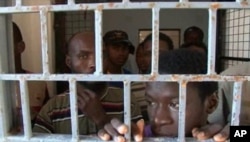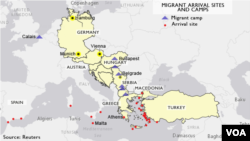The International Organization for Migration said it is scaling up the repatriation of African migrants suffering abuse and exploitation in Libya, mainly at the hands of the police and the militias.
Over the past few months, the International Organization for Migration reports it has repatriated thousands of Africans from Libya, mainly to Burkina Faso, Gambia and Senegal.
In its latest operation a few days ago, IOM returned 117 migrants to Burkina Faso, including five women and two children.
IOM spokesman Itayi Viriri said the migrants told stories of horrific treatment by militias and blatant exploitation at their places of employment. He said many young men spoke about working for weeks on end for no pay.
“We do have examples of young men who were working in construction who, every time they got paid, they were raided – their accommodation was raided by militias who took whatever money they had. There was no one to then go and try and get redress or try and get these obvious crimes investigated," Viriri said.
Vulnerable population
A recent United Nations report found migrants in Libya are vulnerable to exploitation and human rights violations by authorities, armed groups and smugglers.
It said many migrants have been subjected to long periods of arbitrary detention, to torture, forced labor, extortion and other forms of abuse.
Viriri told VOA that IOM has received testimony from African migrants of being beaten up and threatened with other forms of inhumane treatment.
“A few cases where people were abducted with the expectation that ransom would be paid. So, here we have one young man who said if they are arrested in Libya or taken in by these militias, they are expected to pay the equivalent of $700,” he said.
Viriri said most of the migrants evacuated from Libya over the past year were new arrivals. He said they came to IOM voluntarily asking for help to return home because they found their situation to be untenable.


